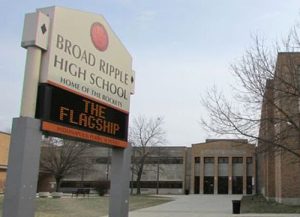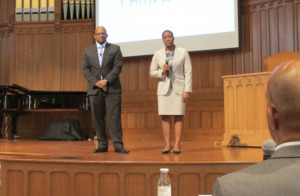Indiana banking on appeal of free one-year college certificates
In Indiana, people who don’t have college degrees can get the training to become welders, electricians, medical assistants, web programmers, or truck drivers—for free.
In Indiana, people who don’t have college degrees can get the training to become welders, electricians, medical assistants, web programmers, or truck drivers—for free.
The program is part of a vision to turn what was once one of the lowest performing schools in Indiana into an educational hub for all ages, from babies to adults pursuing workforce certificates.
Before becoming a teacher, Kim Rosenbaum worked for 14 years as a welder in machine shops—experiences that she thinks make her a better teacher.

Indianapolis Public Schools is considering letting Purdue Polytechnic High School North temporarily use part of the building while the charter school’s permanent home is under construction.

Kindezi Academy, the charter operator that revamped the school in 2016, announced Friday that it would end its partnership with IPS and shut down operations in June due to low student outcomes and facility issues.
Indiana lawmakers want to tighten restrictions on schools offering incentives to attract students, after an unusual virtual program advertised a $1,700 stipend for school supplies, music lessons and Netflix subscriptions.
A long-term study of the state’s On My Way Pre-K program found its students were better prepared for kindergarten and scored slightly higher on ILEARN than children from similar low-income backgrounds.
The Senate Education and Career Development Committee unanimously advanced a proposal Wednesday to require all high school seniors to file the Free Application for Federal Student Aid, known as the FAFSA.
Like many other school districts, IPS wants to diversify its teaching staff to be more representative of the students they serve.
Announced Tuesday, the $30 million Promise Neighborhood grant will boost local efforts in the Near Eastside and Martindale-Brightwood communities to address poverty and improve education and community support systems.
The vaccination rate is higher among teachers and principals—more than 80%—and lower among classified staff such as custodians and food service workers, said Superintendent Aleesia Johnson.
The IPS board is scheduled to vote Thursday on a plan to give $5 million per year to charter partners from the district’s 2018 operating referendum.
Responding to urging from families and other advocates, Indianapolis Public Schools is proposing to share $5 million per year from a recent tax measure with its charter school partners.
The hike is part of a two-year union contract approved Thursday that will give an average 3% raise for teachers this school year and another 3% next year.
Enrollment trends will drive crucial upcoming decisions on the future of the district, such as considering potential school closures, evaluating choice programs, and adding charter school partnerships.
The Indiana State Board of Education will consider Wednesday whether to accredit the schools, which would pave the way for them to participate in the state’s expanding voucher program.
Because of state action earlier this year and federal waivers approved this week. However, poor results won’t affect accountability measurements such as school A-F grades, teacher evaluations, or identifying low-performing schools for intervention.

A Chalkbeat investigation found that the rosy charter pitch for Stemnasium Science Math Engineering Middle School painted over troubling details—lawsuits, financial troubles, questionable academic credentials—that escaped notice by city charter officials and The Mind Trust.
In recent years, Indiana lawmakers have prioritized across-the-board increases for schools over support for disadvantaged students, favoring budget strategies that buoy more affluent districts while higher-poverty schools say they’re left without enough resources to serve disadvantaged students.
The U.S. Department of Education’s Office for Civil Rights opened the investigation this week because of multiple complaints filed with the state that schools’ virtual learning plans did not include individualized services for students with disabilities.